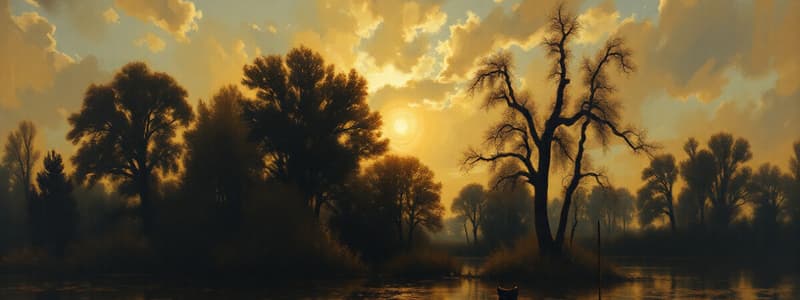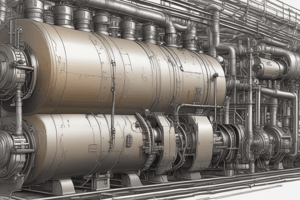Podcast
Questions and Answers
What is a thermodynamic system?
What is a thermodynamic system?
A thermodynamic system is a quantity of matter or a region in space chosen for analysis.
Which of the following are types of thermodynamic systems?
Which of the following are types of thermodynamic systems?
- Isolated (correct)
- Open (correct)
- Closed (correct)
- Partial
What is the difference between heat and work in thermodynamics?
What is the difference between heat and work in thermodynamics?
Heat is energy transferred due to temperature differences, while work is energy transferred when an external force is applied.
The Zeroth law of thermodynamics relates to the concept of temperature.
The Zeroth law of thermodynamics relates to the concept of temperature.
Which of the following are laws of thermodynamics?
Which of the following are laws of thermodynamics?
What is the purpose of a heat engine?
What is the purpose of a heat engine?
The ideal gas process is represented on the ______ and ______ diagrams.
The ideal gas process is represented on the ______ and ______ diagrams.
What are the types of ideal gas processes?
What are the types of ideal gas processes?
What is steam used for?
What is steam used for?
Match the following types of steam with their characteristics:
Match the following types of steam with their characteristics:
Flashcards are hidden until you start studying
Study Notes
Thermal Engineering Overview
- Course Code: 313310, new syllabus for second-year diploma in Mechanical/Production Engineering (2024-2025).
- Includes solved MSBTE previous year question papers and practical knowledge for each topic.
Unit 1: Thermodynamics
- Thermodynamic Systems: Classification into open, closed, and isolated systems; differences between extensive and intensive properties.
- Thermodynamic Processes: Understanding basic processes and cycles.
- Work and Heat: Definitions of work and heat, concepts of flow work, and distinctions between the two; introduction to enthalpy and entropy with examples.
- Laws of Thermodynamics: Overview of Zeroth, First, and Second Laws; statements by Kelvin-Planck and Clausius.
- Application of Laws: Familiarity with devices such as heat engines, heat pumps, and refrigerators; application of steady flow energy equation to systems like boilers, turbines, and condensers without numerical analysis.
Unit 2: Ideal Gas and Steam Fundamentals
- Ideal Gas: Study of gas constant and universal gas constant; derivation of the ideal gas equation.
- Ideal Gas Processes: Types include isobaric, isochoric, isothermal, isentropic, and polytropic; graphical representation on P-V and T-S diagrams.
- Energy Calculations: Determining work done, heat transfer, internal energy, and enthalpy change in ideal gas processes with simple numerical problems.
- Steam Fundamentals: Applications of steam, generation at constant pressure; represented on T-H and T-S charts.
- Types of Steam: Characteristics of wet, dry, and superheated steam.
- Steam Properties: Understanding sensible, latent, and total heat; specific volume and dryness fraction; use of steam tables for property calculations, with emphasis on simple numericals.
- Rankine Cycle: Overview and representation on P-V and T-S diagrams.
Studying That Suits You
Use AI to generate personalized quizzes and flashcards to suit your learning preferences.



